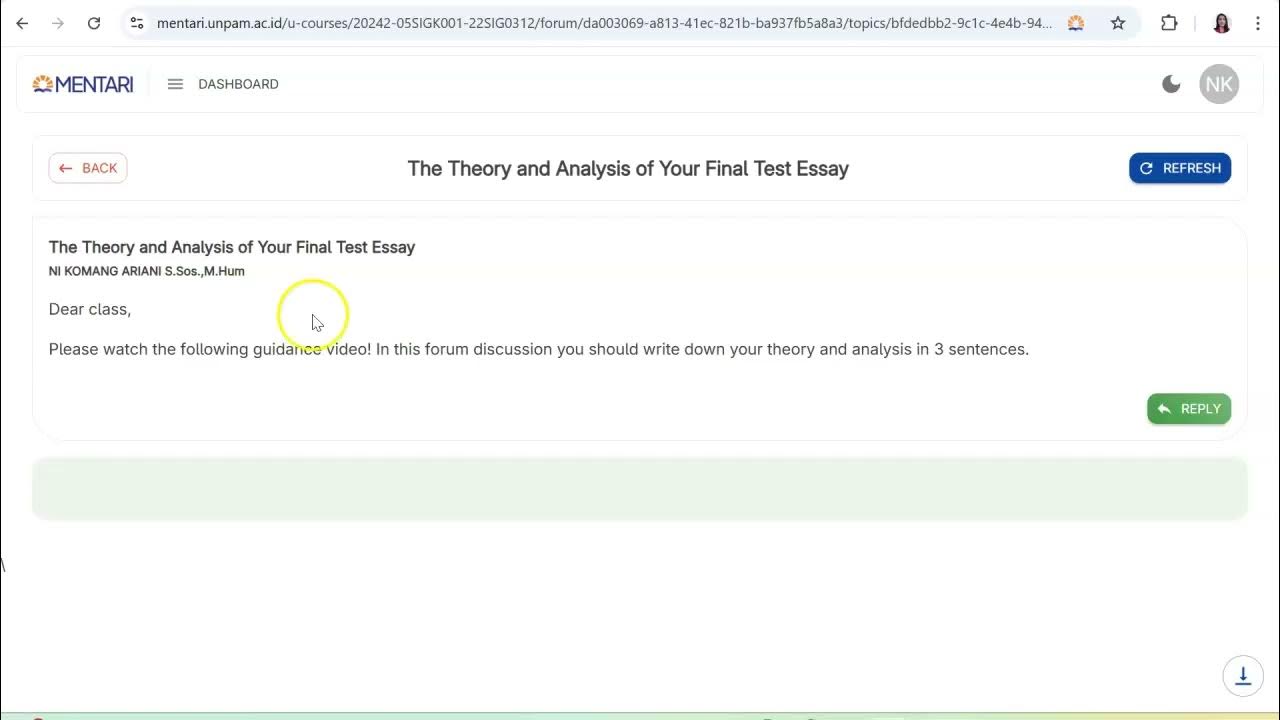Perkuliahan 3 Fundamental ERP (Enterprise Resource Planning)
Summary
TLDRThe speaker in the video addresses students, providing important instructions about an assignment and its submission deadline. They emphasize the significance of submitting tasks on time, as late submissions will be marked as incomplete. The speaker also highlights that the task submission will serve as a form of attendance verification. The speaker ends by apologizing for any potential mistakes in delivering the material and expresses hope that the knowledge shared is beneficial for all, both in this life and the hereafter.
Takeaways
- 😀 ERP systems integrate various business processes, such as finance, HR, production, and sales, into one unified platform.
- 😀 Each module within an ERP system serves a specific function, such as managing finances, inventory, or human resources.
- 😀 The integration of modules ensures seamless data flow between departments, reducing redundancy and improving decision-making.
- 😀 Key ERP modules include Finance, HR, Production, Inventory, Sales, Purchasing, Project Management, Customer Service, Supply Chain, and Business Intelligence.
- 😀 Benefits of ERP integration include improved collaboration, better transparency, and more efficient operations across different departments.
- 😀 Challenges of ERP systems include implementation complexity, high costs for small businesses, and resistance to process changes from employees.
- 😀 Modules like Finance and Sales are tightly integrated, ensuring automatic updates in financial data like revenue and receivables.
- 😀 The system’s integration leads to more accurate inventory management by automatically updating stock levels based on sales and purchases.
- 😀 HR modules manage employee data, payroll, and performance, integrating with other functions to streamline employee management processes.
- 😀 The speaker encourages students to submit their assignments by Wednesday at 12:01 PM, stressing that it is part of attendance verification.
- 😀 The instructor concludes with an apology for any mistakes made during the lesson and hopes the knowledge gained will be beneficial for all students.
Q & A
What is the primary focus of this lecture?
-The primary focus of the lecture is on explaining the different modules of an ERP (Enterprise Resource Planning) system and their importance in business operations.
How does the ERP system benefit businesses?
-ERP systems help integrate various business processes such as finance, inventory, sales, and production into one unified platform, enabling better decision-making, improved efficiency, and data accuracy.
What are some of the key modules of an ERP system discussed in the lecture?
-The key ERP modules discussed in the lecture include Financial Management, Human Resources, Production, Inventory Management, Sales & Marketing, Purchasing, Project Management, Customer Service, Supply Chain Management, and Business Intelligence.
What is the role of the Financial Management module in an ERP system?
-The Financial Management module in ERP helps manage financial transactions, ensuring compliance with accounting standards, and allows businesses to track expenses, revenue, and budgeting.
What is the significance of the Human Resources module in an ERP system?
-The Human Resources module is essential for managing employee-related functions, including payroll, recruitment, and employee performance, helping businesses optimize their workforce.
How does the Production module work in an ERP system?
-The Production module handles the production process by managing schedules, raw materials, and product quality control, ensuring that production meets demand and operates efficiently.
What is the function of the Inventory Management module?
-The Inventory Management module tracks inventory levels, ensures accurate stock management, and helps businesses avoid overstocking or stockouts by providing real-time data on inventory status.
How do ERP modules integrate to ensure smooth data flow?
-ERP modules integrate with one another by automatically updating relevant information across different systems. For example, when a sales order is processed, the Inventory module automatically adjusts the stock levels.
What are some challenges businesses face when implementing an ERP system?
-Challenges in implementing an ERP system include high implementation costs, complexity in adapting existing business processes, and potential resistance to change from employees.
What is the importance of timely submission of tasks mentioned in the lecture?
-Timely submission of tasks is crucial as it ensures proper attendance verification and helps avoid being marked absent. The lecturer emphasized that submissions should be made by the specified deadline to avoid negative consequences.
Outlines

Dieser Bereich ist nur für Premium-Benutzer verfügbar. Bitte führen Sie ein Upgrade durch, um auf diesen Abschnitt zuzugreifen.
Upgrade durchführenMindmap

Dieser Bereich ist nur für Premium-Benutzer verfügbar. Bitte führen Sie ein Upgrade durch, um auf diesen Abschnitt zuzugreifen.
Upgrade durchführenKeywords

Dieser Bereich ist nur für Premium-Benutzer verfügbar. Bitte führen Sie ein Upgrade durch, um auf diesen Abschnitt zuzugreifen.
Upgrade durchführenHighlights

Dieser Bereich ist nur für Premium-Benutzer verfügbar. Bitte führen Sie ein Upgrade durch, um auf diesen Abschnitt zuzugreifen.
Upgrade durchführenTranscripts

Dieser Bereich ist nur für Premium-Benutzer verfügbar. Bitte führen Sie ein Upgrade durch, um auf diesen Abschnitt zuzugreifen.
Upgrade durchführen5.0 / 5 (0 votes)






